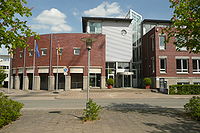OFFIS - Institute for Computer Science
Coordinates: 53 ° 8 ′ 55.9 ″ N , 8 ° 12 ′ 0.4 ″ E
| OFFIS - Institute for Computer Science | |
|---|---|
 OFFIS main building |
|
| Category: | Affiliated institute |
| Carrier: | OFFIS eV |
| Legal form of the carrier: | Registered association |
| Facility location: | Oldenburg |
| Type of research: | Applied research |
| Subjects: | Natural sciences |
| Areas of expertise: | Computer science , business informatics , electrical engineering |
| Basic funding: | Country (100%) |
| Management: | Sebastian Lehnhoff, Susanne Boll-Westermann, Axel Hahn, Andreas Hein, Wolfgang Nebel and Holger Peinemann (managing directors) |
| Employee: | 288 |
| Annotation: | Third-party funding rate of 76% |
| Homepage: | www.offis.de |
The OFFIS - Institute for computer science is in the city of Oldenburg -based affiliated institute of the University of Oldenburg . At OFFIS, new forms of computer-aided information processing in hardware and software systems are researched and research results are implemented in application-oriented developments. The institute was founded on July 6, 1991 by the state of Lower Saxony, the University of Oldenburg and professors from the University's Department of Computer Science. In 2018, it employed 288 primarily scientific staff and had a third-party funding rate of 76%. The thematic focus of OFFIS lies in the areas of energy, health, production and transport.
structure
The institute is a registered association and has statutory organs such as the general assembly, the board of directors and the administrative board and other organizational units that structurally determine OFFIS such as its four application-oriented research and development areas and its competence clusters.
Research and Development Areas
energy
The Energy division develops ICT- based concepts and prototype systems for the energy industry and energy efficiency. It is divided into the following groups:
- Co-simulation of multimodal energy systems
- Distributed Artificial Intelligence
- Data integration and processing
- Energy efficient smart cities
- Intelligence in Energy Systems
- Resilient monitoring and control
- Design and evaluation of standardized systems
health
The Health Division develops ICT- based concepts and prototype systems for health care and medicine. It is divided into the following groups:
- Interactive systems
- Data management and analysis for health services research
- Automation and integration technology
- Biomedical devices and systems
production
The production area deals with the various research questions raised by the increasing introduction of digitization in industrial production. In this way, OFFIS will transfer the ICT competencies acquired for Industry 4.0 from practice-oriented research to business so that it can actively help shape the digital transformation. It is divided into the following groups:
- Smart Human Robot Collaboration
- Manufacturing Operations Management
- Distributed Computing and Communication
traffic
The Transport division develops ICT- based concepts and prototype systems for industry in the transport sector. It is divided into the following groups:
- Cooperating mobile systems
- Human Centered Design
- Safety & Security Oriented Design Methods & Processes
- Safety & Security Oriented Analysis
- Hardware / software design methodology
Competence Cluster
The OFFIS competence clusters bundle technology and process competencies in selected subject areas:
- Architecture Frameworks (AF)
- Cyber Resilient Architectures and Security (CRAS)
- Deep Learning (DL)
- Embedded System Design (ESD)
- Human Machine Cooperation (HMC)
- Multi-Scale Multi-Rate Simulation (MS²)
- Safety Relevant Cyber Physical Systems (SRCPS)
Web links
- Official website
- OFFIS: Registration in the German National Library
- Society of Friends and Supporters of OFFIS e. V.
Footnotes
- ↑ a b c Annual Report 2018
- ^ Foundation of the OFFIS. Retrieved January 6, 2013 .
